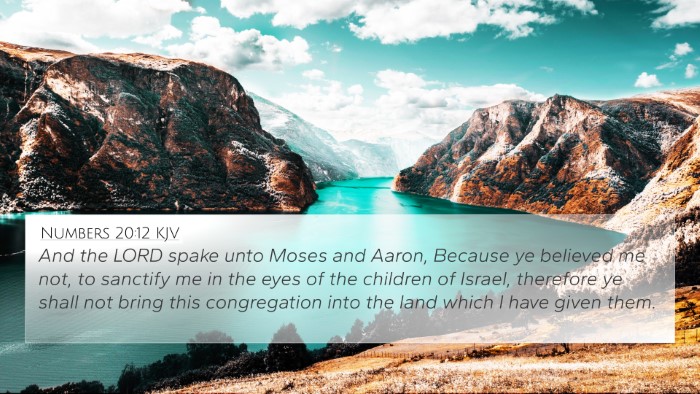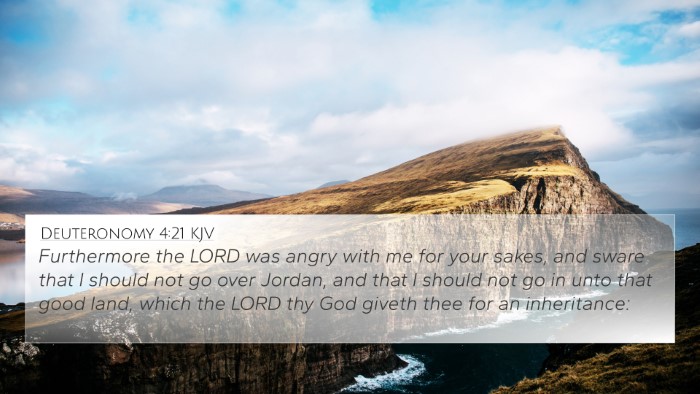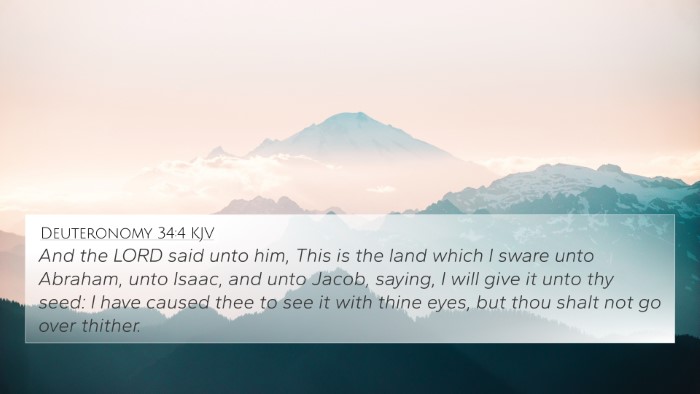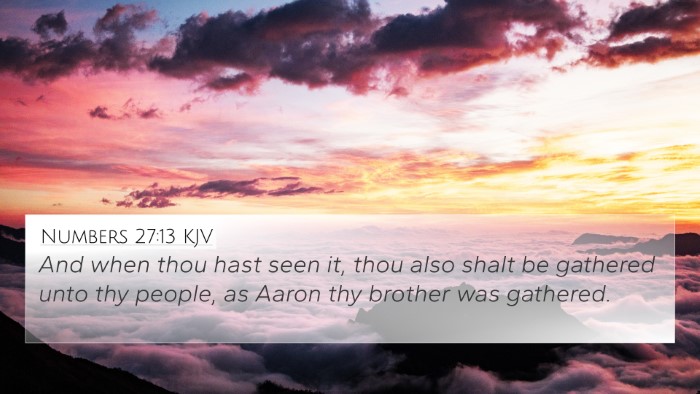Understanding Deuteronomy 1:37
Deuteronomy 1:37 states: "And the Lord was angry with me for your sakes, saying, Thou also shalt not go in thither." This verse is significant as it reflects Moses' personal disappointment and the consequences of the people's actions. It serves to illustrate themes of leadership, accountability, and divine justice. By examining various commentaries, a collective interpretation highlights the intricate message within this verse.
Summary of Context
In this chapter of Deuteronomy, Moses recounts the Israelite journey from Egypt to the Promised Land, emphasizing their failures and disobedience. As their leader, Moses was also held accountable for their actions, which led to God's decree that he would not enter the Promised Land himself.
Commentary Insights
- Matthew Henry: He emphasizes that Moses' exclusion from the Promised Land was a direct consequence of the people's lack of faith. Henry notes that it serves as a sobering reminder of the impact leaders have on their followers, and how their actions are scrutinized by God.
- Albert Barnes: Barnes suggests that God's anger towards Moses indicates the seriousness of his leadership and the need for unwavering trust in God's promises. He points out that Moses' actions, specifically hitting the rock instead of speaking to it (as instructed), were met with significant divine consequences.
- Adam Clarke: Clarke highlights the emotional aspect of Moses' statement, illustrating the burden carried by leaders. His interpretation strengthens the notion that although Moses was a faithful servant, even he faced the repercussions of the collective failure of the Israelites.
Key Themes
- Accountability: Leadership carries a weight of responsibility. Moses’ punishment reflects that leaders are often judged by the actions of those they lead.
- Divine Justice: This verse serves as an illustration of God's righteousness, showing that He holds even His closest servants accountable for their actions.
- Communal Impact: The collective actions of Israel led to individual consequences, emphasizing the interconnectedness of community and leadership.
- Faith and Obedience: The necessity of faith and obedience to God's commands is underscored, highlighting that even slight disobedience can have serious repercussions.
Cross References
Deuteronomy 1:37 can be illuminated further by exploring related Bible verses. Here are some connections to consider:
- Numbers 20:10-12: This passage details the specific event where Moses struck the rock instead of speaking to it, leading to God's judgment.
- Hebrews 3:16-19: Reflects on the disobedient generation and their failures to trust God, drawing parallels to the consequences faced by Moses.
- James 3:1: Emphasizes the stricter judgment awaiting teachers and leaders, reinforcing the theme of accountability from Deuteronomy 1:37.
- Romans 14:10: Talks about individual accountability before God, resonating with the concept that leaders are not exempt from judgment.
- 1 Corinthians 10:1-5: This passage discusses the shared experiences of Israel, relating past events to present implications for the Church.
- Deuteronomy 32:51: Further explains the reason for Moses’ punishment, reinforcing the idea of accountability due to a failure to uphold God’s holiness.
- Matthew 23:14: Jesus highlights the responsibility of leaders and the consequences of leading others astray, expanding on the theme of accountability.
- Luke 12:48: Indicates that to whom much is given, much will be required, linking to the heightened responsibility of leaders like Moses.
- Galatians 6:7: This verse affirms the principle of sowing and reaping, a law that applies to both leaders and followers in the faith.
- John 15:5: Illustrates the reliance on God, signifying that leaders must maintain their relationship with Him to effectively guide others.
Tools for Further Study
If you are interested in conducting a deeper study into the connections between Bible verses, consider the following resources:
- Consult a Bible concordance for identifying related verses.
- Use a Bible cross-reference guide to explore thematic links between scriptures.
- Engage in cross-reference Bible study methods to encourage a comprehensive understanding of biblical themes.
- Explore Bible reference resources available in libraries or online for broader context.
- Utilize tools for finding Bible chain references for deeper connection studies.
Conclusion
Deuteronomy 1:37 serves as a potent reminder of the extraordinary weight carried by leaders and the implications of their actions for their communities. Through various commentaries and cross-references, we see the nuances of accountability, divine justice, and the importance of faith and obedience. As we explore these themes, we engage in a more profound understanding of Scripture and its application to our lives today.
Exploring Inter-Biblical Dialogue
Consider how the principles found in Deuteronomy resonate through other biblical narratives. By examining scriptural cross-referencing, one can uncover thematic connections that span both the Old and New Testaments, aiding in a richer comprehension of biblical messages.








